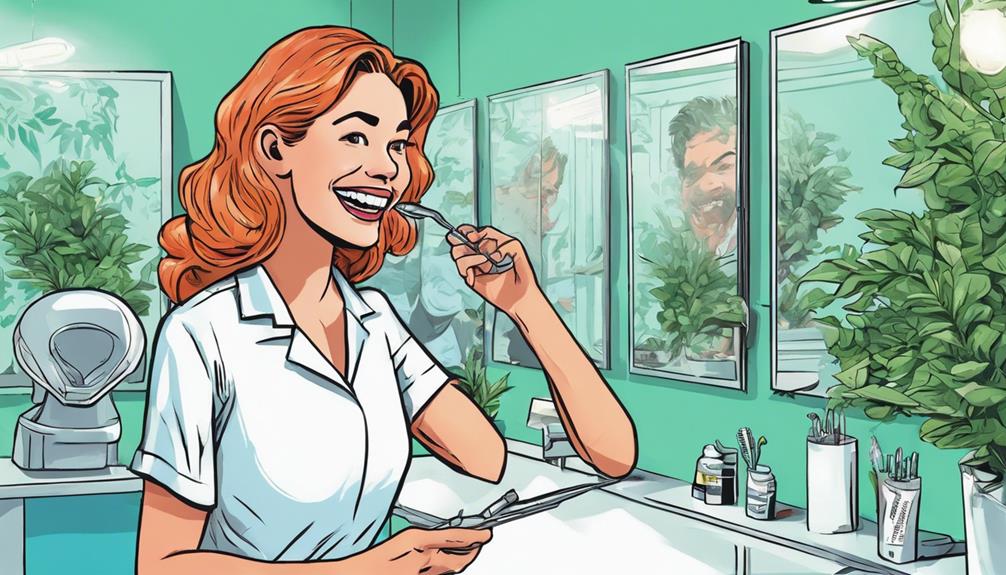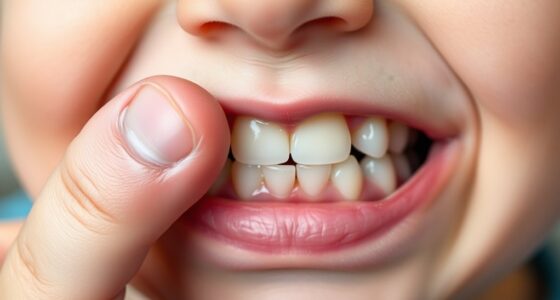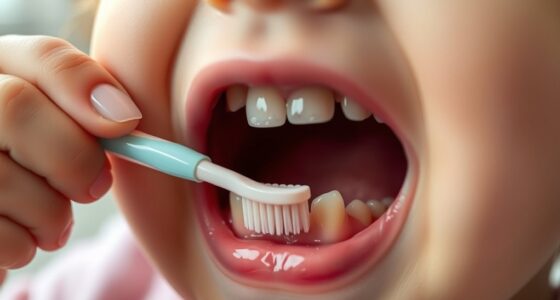The best time to brush your teeth is in the morning and at night. In the morning, brushing removes bacteria that build up overnight and protects your enamel from acidic foods. At night, brushing cleans out food particles and plaque, preventing cavity-causing bacteria from thriving while you sleep. Aim to brush for at least two minutes using fluoride toothpaste. This routine not only freshens your breath but also considerably lowers the risk of cavities and gum disease. If you're curious about enhancing your brushing technique and overall oral care, there's plenty more to discover.
Key Takeaways
- Brush your teeth in the morning to eliminate overnight bacteria and freshen breath before breakfast.
- Wait 30 minutes after consuming acidic foods before brushing to protect enamel.
- Nighttime brushing is crucial for removing plaque and preventing bacteria growth during sleep.
- A consistent brushing routine, both morning and night, reduces the risk of cavities and gum disease.
Optimal Timing for Brushing

Brushing your teeth at the right times can greatly boost your oral health and freshness throughout the day. The American Dental Association recommends brushing at least twice a day, with morning brushing being essential.
When you brush your teeth immediately upon waking, you eliminate overnight bacteria and bad breath. It's best to do this before breakfast to protect your enamel from acidic foods.
Using fluoride toothpaste enhances your dental hygiene, as it strengthens teeth and helps prevent cavities. If you've consumed acidic foods like citrus, wait at least 30 minutes before brushing. This waiting period allows your enamel to re-harden, which reduces the risk of wear during brushing.
Establishing a consistent brushing routine, especially in the morning, sets the tone for your entire day. Evening brushing is equally important, as it removes plaque and food particles that accumulate throughout the day, lowering your risk of cavities and gum disease while you sleep.
Benefits of Morning Brushing

Starting your day with morning brushing not only freshens your breath but also eliminates harmful bacteria that accumulate overnight. This practice guarantees you start your day with a clean mouth, which is vital for maintaining excellent oral hygiene.
By using fluoride toothpaste, you help protect your enamel from the acids found in foods, which is essential for preventing cavities.
Moreover, morning brushing jump-starts saliva production, a natural defense against harmful bacteria and aids in the breakdown of food. This increased saliva also enhances your taste perception, making your breakfast more enjoyable.
Establishing a consistent routine of morning brushing contributes greatly to your overall oral health, helping to reduce the risk of cavities and gum disease. By making this simple habit a priority, you set a positive tone for the day ahead and promote better health in the long run.
Nighttime Brushing Importance

While morning brushing sets a positive tone for the day, nighttime brushing plays an essential role in protecting your teeth from plaque and bacteria that accumulate throughout the day.
When you brush at night, you effectively remove food particles and plaque buildup, preventing the growth of cavity-causing bacteria while you sleep. This is particularly important because salivary flow decreases during the night, making it easier for harmful bacteria to multiply.
The American Dental Association highlights that nighttime brushing is critical for maintaining oral health. By eliminating sugars and acids from your evening meals, you reduce the risk of enamel damage and tooth decay. Skipping this essential step can lead to increased plaque buildup, which can harden into tartar, complicating your dental care routine.
Establishing a consistent nighttime brushing routine not only enhances your oral hygiene but also mitigates the risk of systemic health issues associated with poor dental care, such as gum disease.
Techniques for Effective Brushing

To effectively clean your teeth, hold your toothbrush at a 45-degree angle toward your gums for ideal plaque removal. When brushing your teeth, use short back-and-forth strokes, ensuring you cover all surfaces—outer, inner, and chewing—for at least two minutes. A pea-sized amount of fluoride toothpaste will help strengthen your enamel and protect against cavities.
Here's a quick reference table to help you with effective brushing techniques:
| Step | Action | Frequency |
|---|---|---|
| Angle | 45-degree angle to gums | Every brushing session |
| Duration | At least 2 minutes | Each time you brush |
| Toothpaste | Pea-sized fluoride toothpaste | Every session |
| Toothbrush care | Replace every 3-4 months | As needed |
| Flossing | Incorporate before brushing | Daily |
Additional Oral Care Tips

Incorporating daily flossing and using mouthwash can greatly enhance your oral care routine, helping you maintain healthier teeth and gums. Flossing before bed is essential for removing food particles and plaque that your toothbrush might miss. This simple step contributes to gum health and notably reduces your risk of cavities.
After brushing, rinse with alcohol-free mouthwash to kill bacteria and freshen your breath without drying out your mouth. Remember to replace your toothbrush every 3-4 months or sooner if the bristles are frayed. A worn toothbrush won't effectively remove plaque and can irritate your gums.
Drinking fluoridated water also plays a vital role in your dental care. It strengthens tooth enamel and assists in the remineralization process, further lowering your cavity risk.
Keep dental care items, such as a travel toothbrush and toothpaste, handy at work or in your bag. This encourages midday brushing, helping you maintain good oral hygiene throughout the day. By integrating these tips into your routine, you'll not only promote gum health but also increase your overall dental wellness.
Frequently Asked Questions
What Is the Best Time of Day to Brush Your Teeth?
The best time to brush your teeth is twice daily—once in the morning and once before bed. This routine helps eliminate bacteria, freshens your breath, and protects your enamel from acidic foods and plaque buildup.
Is It Better to Brush Your Teeth Before or After Breakfast?
Studies show brushing before breakfast can reduce plaque buildup by up to 80%. You'll protect your enamel and prevent cavities better this way. Plus, it helps stimulate saliva, which aids in digestion and oral health.
Is It Better to Brush Your Teeth Before or After Coffee?
It's better to brush your teeth before coffee. Doing so removes bacteria and plaque, protecting your enamel from the acidity in coffee. If you must brush afterward, wait 30 minutes to minimize enamel damage.
Which Brush Is More Important Morning or Night?
Imagine waking up with a fresh start or sinking into sleep with a clean slate. Both morning and night brushing are essential, but nighttime brushing's important for fighting bacteria while you dream. Don't skip it!
Does Brushing Your Teeth at a Specific Time of Day Help Prevent Bad Breath?
Brushing your teeth at specific times of the day can contribute to preventing bad breath. By practicing good oral hygiene, you can reduce the bacteria that cause bad breath. However, for the ultimate bad breath solution, it’s also important to floss, use mouthwash, and visit the dentist regularly.
Conclusion
Brushing your teeth in the morning sparks a fresh start, while nighttime brushing acts as a protective shield against decay.
Imagine waking up with a bright smile, only to go to bed without safeguarding it.
By prioritizing both moments, you're not just maintaining oral health; you're investing in your confidence and well-being.
So, embrace the contrast: seize the day with morning brushing, and end it with the care your teeth deserve.
Your smile's future depends on it!









